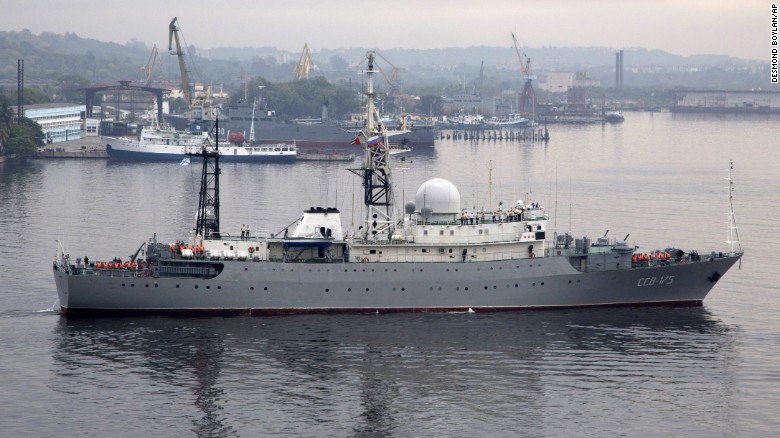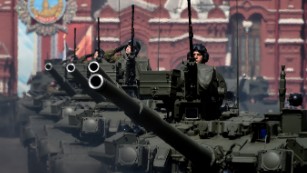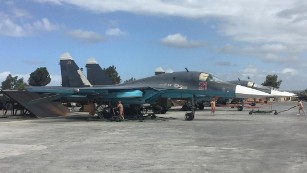Russian provocation: Bluster or genuine peril?
There's a Russian spy ship off the coast of Connecticut. Crammed with eavesdropping equipment, the Viktor Leonov has loitered in these waters before, but its current visit is the latest in a string of provocations.
The last few years have seen dangerous Russian "fly-bys" of US warships, close encounters in the skies, when Russian military aircraft have flown with transponders switched off, and the occasional Russian submarine hiding in Swedish waters.
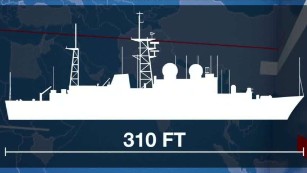
Russian spy ship lurks off Connecticut coast
Earlier this month, according to the Pentagon, four Russian jets flew in an "unsafe and unprofessional" manner near a U.S. Navy destroyer in the Black Sea. Perhaps the Leonov's visit was a message: "If you turn up on our coast ..."
Such provocative acts could easily lead to unintended consequences at a time when, according to Russian Foreign Minister Sergei Lavrov, channels for avoiding misunderstandings are frozen.
And that risk also applies in Syria, where Russian and US bombers fly above a fluid battlefield in pursuit of very different objectives.
In recent years, Russia's military has become more assertive and more capable, directed by the Kremlin to probe for weaknesses, sow uncertainty and exploit opportunities.
Is Russia's obsession with Trump waning?
What is Putin up to?
For NATO officials, 2014 was the watershed year, when in the chaotic aftermath of protests in Ukraine, Russia's "little green men" grabbed Crimea.
Russia's military might: Putin's policy in numbers
Sitting in Simferopol as Russian special forces consolidated their hold on Crimea, I wondered whether Russian President Vladimir Putin was "an opportunist, grabbing at chances to poke the West in the eye, or a clever strategist with the longer-term goal of restoring a greater Russia?"
Two years on, I still don't have an answer.
But there's no doubt the Russian military is leaner and more agile and the Kremlin wants to project Russian power. It's a potent combination.
Not so long ago, Russia's armed forces were huge and relied upon overwhelming power - "a large hammer always in search of nails" as security analyst Michael Kofman puts it. Even the brief incursion into Georgia in 2008 was dogged by mishaps.
In the past decade, Russia has reportedly committed $700 billion to updating its armed forces in this decade, making them more mobile. But its defense budget is still far lower than that of the US, and according to several western studies, the modernization program has been disrupted by delays and corruption.
Russia is using this modernized force to test US commitment to safeguarding international security and looking for signs of self-doubt, chinks in its armor.
Iraq, Libya, Syria: these conflicts have hardly been triumphs for the West. They have fed a dislike among western publics of expensive foreign entanglements.
Moscow will do all it can do to feed this mood, undermine institutions such as the European Union and NATO, and promote isolationism among western publics.
And in the meantime it will look for further opportunities to project its own influence; its carrier Admiral Kuznetsov, for example, was recently spotted off the coast of Libya after a spell in Syrian waters.
Russia's military might in numbers
How's he selling it?
Vladimir Putin has frequently spoken of restoring Russia's "great power" status, even lamenting the passing of the Soviet Union.
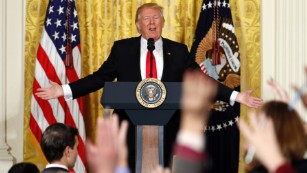
Trump discusses recent Russian provocations
In doing this, he wants to cast the West as the aggressor, and so conjures up the ancient Russian fear of encirclement. And he has moved to avenge previous humiliations. In March 2014, as the Russian flag rose in Crimea, he insisted the West had lied to and deceived Russia on everything from Kosovo to NATO expansion and Libya.
Just this week, Putin told Russia's intelligence service, the FSB, that NATO was "provoking us constantly and ... trying to draw us into confrontation," with "continued attempts to interfere in our internal affairs in a bid to destabilize the social and political situation in Russia itself," according to Russia Today.
Russia, he told the FSB, was the true victim of espionage and a growing tide of cyberattacks.
"Many existing threats and challenges have only become more acute," Putin warned.
Russia happy with new status in world
How Russia has changed its way of warfare
Much analytical ink has been spilled about Russia's embrace of "hybrid warfare." A better term might be "unconventional aggression" -- the use of surrogates and proxies, as well as disinformation and propaganda.
Deceiving, subverting, destabilizing: all of these tactics are cheaper and more deniable than sending in tanks or firing missiles. Electronic warfare, such as attacks on computer systems and internet communications, is a tool of growing importance, and has been used to great effect in Ukraine.

The Cold War: Then and now
Russia realizes that the Western militaries have a substantial technological edge, but in the words of the Chief of the Russian General Staff Valery Gerasimov, the enemy "will always have vulnerabilities."
In 2013, Gerasimov said the use of "political, economic, informational, humanitarian, and other non-military measures" now exceeded the power of weapons in some cases.
This is a wide canvas and makes predicting Russian behavior all the more difficult.
Where opportunities arise, the use of conventional military force is still part of the mix. It provides an opportunity to show off, test and improve Russia's armory.
In Syria, Russian air power has been used intensively to wipe out alternatives to the Assad regime.
Russia flexes its military might in Syria
The Syria expedition has in part been about showing that Russia can and will use its military might when it believes its interests are at stake. Russia's most advanced fighter bomber, the SU-34, and its most advanced anti-aircraft and anti-missile system have been deployed, and its airforce was able to sustain a high tempo of sorties for weeks on end.
In Ukraine, pro-Russian militia have done much of the fighting but sometimes greater force is brought to bear. Near Ilovaisk in September 2014 we encountered massive damage to Ukrainian armor inflicted by forces which clearly used advanced systems. Whether those forces were pro-Russian or actually Russian was the subject of hot debate, but separatist militia rarely possess the equipment to bring down an airliner at 30,000 feet.
According to Kofman, a Fellow at the Wilson Center's Kennan Institute, the Russian approach is that "force must be used cheaply, deniably when necessary, and with emphasis placed on retaining agility."
What millennials think of Putin's Russia
Does the US really have anything to worry about?
The skulking submarines and provocative fly-bys may be foolhardy, but they are incidents.
Of far greater concern would be an apparent violation by Moscow of arms control treaties.
For three years, the US has contended that Russia's development of a medium-range nuclear missile capable of hitting much of Europe -- the SSC-X-8 -- violates a long-standing agreement banning such weapons. Now, US officials say, at least one such missile battery is operational. Russia has previously denied breaching the treaty.

US: Russia violates treaty with secret missile
But the West is not without its own strengths.
Despite US President Donald Trump's carping about NATO members not spending enough on defense and describing the alliance as "obsolete," US Defense Secretary Jim Mattis Thursday reiterated Washington's commitment to the alliance.
The US and European industrial base is far better equipped to turn out state-of-the-art hardware.
And Russia has fundamental weaknesses: its economy is limping along (thanks to the decline in oil prices) amid growing poverty levels and a demographic crisis. Sanctions have also hurt.
NATO struggles for different reasons. The Alliance was designed to deter a massive Soviet ground invasion; it's trying to adapt to a very new use of power. It has deployed units to Poland and the Baltic states, but these are warning flags rather than truly deterrent forces. And if Russia does proceed with deploying a new generation of medium-range nuclear missiles, NATO will have to respond.
Senators urge Trump to get tough on Russia
How will the US likely react?
The US response to a more assertive Russia is hard to predict.
The policies of the new administration are in their infancy, but international tours by the new Secretaries of State and Defense are designed to reassure allies and perhaps send a metaphorical shot across Russia's bows.
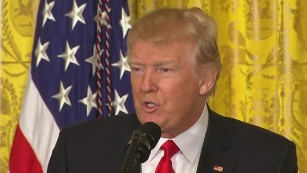
Trump: Russia is fake news
"They have to live by international law just like we expect all mature nations to do," Defense Secretary Jim Mattis said Wednesday.
Signals from the White House are tougher to read. President Trump said Thursday he could easily have ordered an attack on the Russian surveillance ship off the US coast. But then he added that would "not be great" and that "hopefully I won't have to do anything."
"Having a good relationship with Russia is a good thing, not a bad thing," Trump tweeted last month. This week he reiterated that view, but added: "Probably Putin assumes that he's not going to be able to make a deal with me because it's politically not popular for me to make a deal."
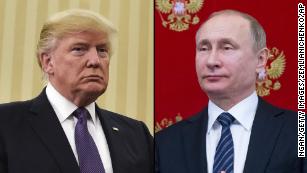
Trump talks about shooting Russian ship
Different parts of the new administration have issued mixed messages about its relationship with Russia, about sanctions and Crimea, and about future nuclear arms negotiations. That's already provoking comments from Russian politicians.
Trump has become Putin's ally in war on West
Writing in the latest edition of Foreign Affairs, three scholars argue that "Washington will need to chart a middle path [with Russia.] That means both seeking ways to cooperate with Moscow and pushing back against it without sleepwalking into a collision."
But such an approach would demand finesse, clearly stated red lines and consistency in the face of a wily opponent.
News Courtesy: www.cnn.com

